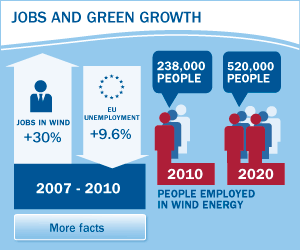
French Environment Minister Delphine Batho
Writing in France’s prestigious centre-left daily newspaper Le Monde, Peter Altmaier, the German environment minister, and Delphine Batho, his French counterpart, underlined the need for a 2030 renewable energy target and highlighed the importance of renewables in transforming the European economy, improving energy security and reducing greenhouse gas emissions.
“We want to make the energy transition [moving to produce a significant amount of electricity from renewables] the new motor of the Franco-German couple,” stated the letter. It noted that the two countries recently decided to create a joint renewable energy office that will focus on promoting cooperation between companies, and on encouraging political and scientific collaboration on renewables.
France is aiming to reduce the share of nuclear in its electricity production from 75% to 50% by 2025, to increase the country’s energy efficiency by around 20%, and by 2020 to produce around 23% of electricity from renewables, according to Ms Batho. Germany, meanwhile, wants by 2022 to no longer produce any energy from nuclear power and by 2030 to produce at least 50% of its electricity from renewables. continue reading »

Thomas Becker, EWEA CEO.
Commenting on the call from BusinessEurope Director General Markus J Beyrer on EU energy policy, European Wind Energy Association CEO Thomas Becker had this to say;
It sounds a little old fashioned when BusinessEurope claims that fighting climate change is not compatible with cost-competitiveness and security of supply. What have they been doing for the last 15 years? What planet were they on?
The main problem of the energy situation today in Europe is the massive subsidies – still in 2013 – going to fossil fuels and nuclear.
If that was corrected and with a properly functioning electricity market there would be no discussion of what choice policy makers would make for the energy mix.
But even without such a correction, wind energy is already cheaper than nuclear, and in an increasing number of locations already cost competitive with new gas and coal.
continue reading »
 Wind energy costs are falling and some companies involved in wind are seeing a rise in profits, according to evidence which has appeared in the world’s media this month.
Wind energy costs are falling and some companies involved in wind are seeing a rise in profits, according to evidence which has appeared in the world’s media this month.
In Europe, insurance firm Allianz was quoted by Reuters as saying last week that “renewable energy production and infrastructure are gaining investor appeal as they become less dependent on government support in more European markets”.
The firm invests heavily in renewable energy projects because they “offer attractive feed-in tariffs, are already at grid parity (competitive with conventional energy) or are going in that direction.” Spanish and Italian wind and solar installations are the “most advanced in terms of profitability while those in the Nordic countries, Britain, Germany, France and the Benelux would be catching up,” Armin Sandhoevel, Chief Investment Officer for renewables at Allianz, said.
continue reading »
 If all the costs of fossil fuel power generation were detailed in German power bills they would exceed the costs of renewable energy “by a wide margin”, a study by Greenpeace Energy Germany and the German Wind Energy Association (BWE) says.
If all the costs of fossil fuel power generation were detailed in German power bills they would exceed the costs of renewable energy “by a wide margin”, a study by Greenpeace Energy Germany and the German Wind Energy Association (BWE) says.
Currently German power bills clearly outline the cost of the EEG – the support that is channelled to renewable energy and charged to the consumer as a levy – but the costs of conventional fuels are hidden. “State incentives for nuclear and coal are sometimes part of rules that increase the price of power and sometimes part of government budgets. In both cases consumers cannot directly see the full cost in their power bills,” the report says.
In 2012 the EEG levy cost the consumer €c3.59 per KWh, while the report estimates that if there were a similar levy for fossil fuels it would cost €c10.2 per KWh – almost three times as high as the EEG.
continue reading »
 The International Monetary Fund (IMF) has just published a report showing that almost 9% of all annual country budgets are spent supporting oil, natural gas and coal industries through direct subsidies, consumer rebates and avoided taxes on pollution. The report estimates that worldwide subsidies to fossil fuels total $1.9 trillion [€1.5 trillion] – the equivalent to 2.7% of global GDP, or 8% of government revenues, the IMF says.
The International Monetary Fund (IMF) has just published a report showing that almost 9% of all annual country budgets are spent supporting oil, natural gas and coal industries through direct subsidies, consumer rebates and avoided taxes on pollution. The report estimates that worldwide subsidies to fossil fuels total $1.9 trillion [€1.5 trillion] – the equivalent to 2.7% of global GDP, or 8% of government revenues, the IMF says.
Wind energy is frequently criticised in the media and by some politicians because it receives government support – which is true. But, have those who raise these views ever stopped to think about the enormous sums in government support fossil fuels have received over their lifetimes – and still do as the latest IMF data testifies?
As a means of comparison, in 2011 alone the International Energy Agency estimated that global fossil fuel direct subsidies were worth $523 billion, compared to $88 billion for renewables.
continue reading »











